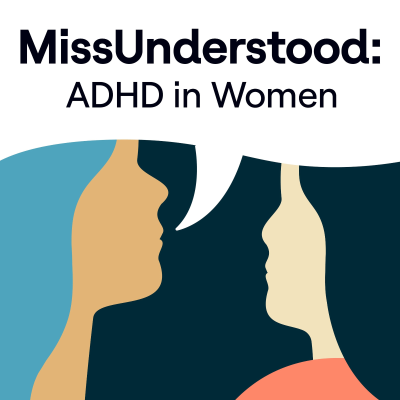
MissUnderstood: The ADHD in Women Channel
Podcast von Understood.org
From Understood.org, this is MissUnderstood: The ADHD in Women Channel. It’s the first-ever podcast channel for women with ADHD. For decades, women w...
Kostenlos testen für 30 Tage
Nach der Testphase nur 4,99 € / Monat.Jederzeit kündbar.
Alle Folgen
57 FolgenSometimes, our brains spiral and it seems like there’s nothing we can do about it. This can happen to anyone. Maybe you have an awkward social interaction and can’t stop thinking about it — then your mind jumps to worse and worse scenarios, far from what actually happened. And for those of us with ADHD, it can be extra difficult to exit that spiral. A situation like this happened to Rae Jacobson recently. Thankfully, she had an interview on the books with Dr. Jodi Gold, a psychiatrist who also has ADHD. Jodi specializes in psychotherapy of anxiety and mood disorders — perfect. On this episode of Hyperfocus, Rae and Jodi have an impromptu therapy session featuring a discussion of automatic thoughts, mood dysregulation, and rejection sensitivity. And, yes, “ADHD rabbit holes.” Related resources * The influence of ADHD on social skills [https://www.understood.org/en/podcasts/sorry-i-missed-this/the-influence-of-adhd-on-social-skills] * Anxiety, imposter syndrome, and ADHD (Mallory’s story) [https://www.understood.org/en/podcasts/adhd-aha/anxiety-imposter-syndrome-adhd] * What is perseveration? [https://www.understood.org/en/articles/perseveration-adhd-and-learning-differences] Timestamps (2:23) Rae’s situation (6:56) What do we really mean by “rabbit hole?” (13:00) On automatic thoughts (17:53) Masking and people-pleasing We love hearing from our listeners. Email us at hyperfocus@understood.org [hyperfocus@understood.org]. For a transcript and more resources, visit the Hyperfocus page [https://www.understood.org/en/podcasts/hyperfocus/how-to-climb-out-of-mental-rabbit-holes] on Understood. Understood is a nonprofit organization dedicated to empowering people with learning and thinking differences, like ADHD and dyslexia. If you want to help us continue this work, donate at understood.org/give [http://understood.org/give]
ADHD traits such as forgetfulness and impulsivity are often viewed as ‘bad behavior’ while growing up. Kids with ADHD might get punished for these things that are actually due to their brains working differently. So what happens when these kids grow up into adults with ADHD? Some might continue to punish themselves. This week on Tips from an ADHD Coach, Jaye breaks down why the threat of punishment is not the most effective motivator for people with ADHD, and gives some tips that can help end the cycle. Related resources * Masking ADHD symptoms to go above and beyond (René Brooks’ story) [https://www.understood.org/en/podcasts/adhd-aha/masking-adhd-symptoms-rene-brooks] * Behavior: What is it and how can parents affect it? [https://www.understood.org/en/podcasts/parenting-behavior/behavior-what-is-it-and-how-can-parents-affect-it] * 7 discipline tips when your child has ADHD [https://www.understood.org/en/articles/adhd-discipline-strategies] Timestamps (00:41) René’s quote (02:18) ADHD is not defiance (05:01) Ways we punish ourselves (06:28) How can we motivate ourselves without punishment? (11:05) Recap For a transcript and more resources, visit the MissUnderstood page [https://www.understood.org/en/podcasts/missunderstood/past-punishment-adhd-traits-advice] on Understood. Have a challenge you’d like Jaye to talk about in an episode? Email or send a voice memo to us at adhdcoachtips@understood.org [adhdcoachtips@understood.org] Understood is a nonprofit organization dedicated to empowering people with learning and thinking differences, like ADHD and dyslexia. If you want to help us continue this work, donate at understood.org/give [http://understood.org/give]
Monogamous romantic relationships have been seen as the norm for a long time. They’re the kind most commonly represented in the media, often as the only “right” kind of relationship. However, open relationships, polyamory, and other consensual non-monogamous relationships are more common than you might think. People with ADHD often find ways of living life outside of the typical standard. This could include being non-monogamous! Martha Kauppi is a marriage and family therapist and sex therapist. She is the author of the book Polyamory: A Clinical Toolkit for Therapists (And Their Clients). Listen to this conversation on jealousy, reaching agreements with your partner, and what consensual non-monogamy really is. Related resources * Polyamory: A Clinical Toolkit for Therapists (And Their Clients) by Martha Kauppi [https://www.instituteforrelationalintimacy.com/book] * 8 Steps To Opening Up: Starting The Conversation About Non-Monogamy, a Free eBook by Martha Kauppi [https://www.instituteforrelationalintimacy.com/8-steps-to-opening-up-understood] * Martha Kauppi’s website, www.instituteforrelationalintimacy.com [https://www.instituteforrelationalintimacy.com] Timestamps (00:55) Why learn about consensual non-monogamy? (04:04) What is consensual non-monogamy? (05:36) What is the biggest misconception about non-monogamy? (08:40) Building a relationship that works for you, not just what you see in the media (11:46) Viewing non-monogamy as an option in life (15:42) Moving toward consensual non-monogamy in a relational way (21:03) How would you start a conversation about opening your currently monogamous relationship? (24:20) Tips for working through jealousy (25:35) What is compersion? (30:13) It’s OK if non-monogamy isn’t for you! (32:10) Where can you find Martha? For a transcript and more resources, visit the Sorry, I Missed This page [https://www.understood.org/en/podcasts/sorry-i-missed-this/consensual-non-monogamy-relationships-adhd] on Understood. We love hearing from our listeners. Email us at sorryimissedthis@understood.org [sorryimissedthis@understood.org]. Understood is a nonprofit organization dedicated to empowering people with learning and thinking differences, like ADHD and dyslexia. If you want to help us continue this work, donate at understood.org/give [http://understood.org/give]
Imagine sitting down for a meal, but somehow, you can’t quite focus on the food in front of you. You’re either distracted by the things around you, or the never-ending to-do list in your head. For many women with ADHD, eating often feels like an afterthought. In this episode, Dr. Monica Johnson explains how ADHD impacts eating habits. From planning meals in advance to impulsive eating and forgetting to eat altogether. Listen as she shares the unique challenges women face in maintaining healthy eating patterns. And learn ways to have a more balanced relationship with food. Related resources * ADHD and women [https://www.understood.org/en/topics/adhd-women] * ADHD and diet [https://www.understood.org/en/articles/adhd-and-diet-what-you-need-to-know] * ADHD and eating disorders [https://www.understood.org/en/articles/adhd-eating-disorders] Timestamps (01:19) Types of eating issues (04:51) ADHD, forgetfulness, and eating (05:50) How to practice healthy eating patterns To get a transcript and check out more episodes, visit the MissUnderstood channel [https://www.understood.org/en/podcasts/missunderstood/adhd-in-women-eating-habits] at Understood. We love to hear from our listeners. Email us at podcast@understood.org [podcast@understood.org]. Understood is a nonprofit organization dedicated to empowering people with learning and thinking differences, like ADHD and dyslexia. If you want to help us continue this work, donate at understood.org/give [http://understood.org/give]
How to ADHD creator Jessica McCabe has been the source of many ADHD “aha” moments — so what were her ADHD “aha” moments? Jessica was diagnosed when she was 12 years old but didn’t start to look into what ADHD meant for her until she was 32. Taking ADHD medication felt like putting on glasses — experiencing the world as everyone else did. But she didn’t have the skills and strategies to cope with ADHD. So, she started making YouTube videos...and the rest is history. Listen in as Jessica answers Laura’s many questions, including: What’s it like for her to be a new mom with ADHD? Does she ever get a vulnerability hangover? And why doesn’t she think she’s cool? Related resources * Jessica’s YouTube channel, How to ADHD [https://www.youtube.com/@HowtoADHD] * All about ADHD medication [https://www.understood.org/en/articles/adhd-medication] * Understanding trouble with social skills [https://www.understood.org/en/articles/trouble-with-social-skills] Timestamps (03:08) How Jessica feels about being involved in so many people’s “aha” moment (04:55) Jessica’s diagnosis story at age 12 (06:16) Jessica’s ADHD medication “aha” moment (07:33) The creation of Jessica’s YouTube channel How to ADHD (11:29) Jessica on social anxiety (14:07) Busting ADHD medication stigma (16:52) ADHD and new motherhood (22:49) Going back to work after maternity leave (26:01) Laura’s rapid-fire questions (31:49) Jessica’s parting words To get a transcript of this show and check out more episodes, visit the ADHD Aha! podcast page [https://www.understood.org/en/podcasts/adhd-aha/Jessica-mccabe-motherhood-social-anxiety-adhd-medication] at Understood. Want to share your ADHD “aha” moment? We love hearing from our listeners. Email us at ADHDAha@understood.org [ADHDAha@understood.org]. Understood is a nonprofit organization dedicated to empowering people with learning and thinking differences, like ADHD and dyslexia. If you want to help us continue this work, donate at understood.org/give [http://understood.org/give]
Nutze Podimo überall
Höre Podimo auf deinem Smartphone, Tablet, Computer oder im Auto!
Ein ganzes Universum für Unterhaltung für die Ohren
Tausende Hörbücher und exklusive Podcasts
Ohne Werbung
Verschwende keine Zeit mit Werbeunterbrechungen, wenn du bei Podimo hörst
Kostenlos testen für 30 Tage
Nach der Testphase nur 4,99 € / Monat.Jederzeit kündbar.
Exklusive Podcasts
Werbefrei
Alle frei verfügbaren Podcasts
Hörbücher
20 Stunden / Monat

































